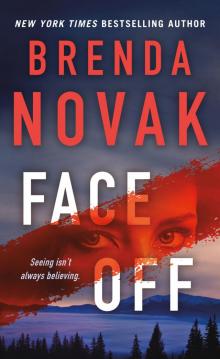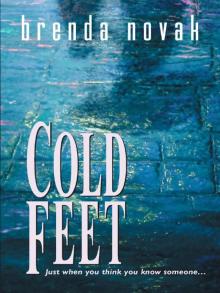- Home
- Brenda Novak
Body Heat Page 4
Body Heat Read online
Page 4
“Like you were proud of me when I was cutting lettuce in your fields and you’d come by and completely ignore me?”
Bruce didn’t respond to the jab, but the tenor of his voice changed, grew softer. “You could make a difference to what’s happening here. I know it.”
“Since when did you start caring about Mexicans?”
“I’ve been a member of this community all my life. Do you think I want to see senseless hate crimes tear it apart? I’m not a monster, Rod. I may not be happy about droves of people entering this country illegally, but that doesn’t mean I want to see them murdered.”
“Yeah, where would you be if you had to pay for white labor?”
“I’m good to my workers.”
It was true that he’d been more generous than some farmers. That was another reason his mother had stayed. She interpreted this generosity to mean more than it really did. But Rod didn’t want to give him even that much. Besides, what was happening in Bordertown wasn’t Rod’s problem. He’d finally escaped. No way was he willing to let this draw him back. “I live in California now, Mr. Dunlap. Since my mother died, there’s nothing left for me in Arizona.” Except Jorge. But speaking to him on the phone and sending the occasional package was enough.
“I’ll pay you,” Bruce offered.
“Absolutely not.” He rubbed his temple to relieve the beginnings of a headache. “I don’t want your money.”
“You took it readily enough when your mother died!”
Clenching his jaw, Roderick spoke through gritted teeth. “Are you kidding me? I was sixteen years old and had just lost the only person I had in the world. I couldn’t have paid for a decent burial without that money, and you know it.” That was the only reason he’d taken it. He would never have accepted it if it hadn’t been for her. “Besides, I paid you back. I made a payment every month afterward, even if it meant I went hungry.” He’d had a hard time surviving the next two years. He’d mostly drifted, taken odd jobs as a dishwasher or a field hand or a painter. He’d probably still be rambling around without tether or anchor if not for a certain navy recruiter who’d worked down the street from an office he’d been painting. After badgering him for weeks, Linus Coleman had talked him into getting his G.E.D. and joining the navy. Rod had signed on the dotted line mostly because he’d been promised a free college education. But his commitment to the armed forces had quickly evolved into much more than that. In the navy, he’d found a home, friends who were more like brothers, purpose in what he did, some self-esteem. But it hadn’t been an easy road.
“I never cashed those checks, Rod,” his father said. “That’s your problem. They were money orders. It’s not as if you were doing me any favors by not cashing them.”
“I thought there might come a time when you’d actually include a return address on the envelope so I could send them back. I brought them with me to your BUD/S graduation, but…you didn’t give me the chance to pull you aside long enough to speak privately. I never begrudged you a cent of that money.”
“You’re the one who brought it up.”
“I guess…I guess I was trying to point out that there’ve been times when I’ve…tried to help.”
“If that’s ‘trying to help,’ you’re even more pathetic than I thought,” he said, and disconnected as Rachel Ferrentino, a fellow operative and good friend, came into the room.
“Hey,” she said. “What’s up?”
She looked concerned, so he plastered his usual easygoing smile on his face. “Nothing. Why?”
“Milt’s throwing a fit. Says you have no respect for his time.”
“It’s not just his time. I have no respect for him.”
He expected her to laugh, but she refused to let him throw her off track. She’d figured out that something significant had occurred.
“That was important, huh?” She eyed his phone.
Trying once again to bury the memories conjured up by his father’s call—and the pain associated with them—he drew a deep breath. “Not really.”
Her eyebrows knotted with skepticism. “You’re full of crap. You know that?”
“That’s what I’ve been told,” he replied, and sauntered past her, chucking her on the chin as if his heart wasn’t racing like a rabbit’s.
The air-conditioning at the station was working double time to counter the heat of another one hundred and ten degree day, but Sophia was far from comfortable. She knew Detective Lindstrom would be showing up any minute. Lindstrom had called while she was at the crime scene, almost as soon as she’d hung up with the mayor, which meant she’d had two agonizing conversations in a row. Lindstrom had heard about the shooting via her police radio and was furious that Sophia hadn’t notified her. Sophia had used the excuse that she couldn’t be sure this shooting was related to the others, not until she’d had a look, but that had—understandably—done little to placate Lindstrom. By the time she arrived at the scene, there’d been nothing left except the tape that cordoned off the area and a spot of blood from the male victim’s body. Along with the limited artifacts found in the victims’ clothing, Sophia had taken the spent shell casings, and the morgue had taken the bodies. Because they were dealing with homicide victims, there’d be an autopsy, but Sophia didn’t expect it to reveal anything she didn’t already know, at least about the manner of death.
Ironing out the sheet of paper with the phone number she’d found on “José,” she picked up her phone. She needed to identify the victims so she could call the Mexican consulate and have them notify the families of the deceased. With luck, the person at this number would be able to help.
Six rings. Then a voice speaking English with a strong Mexican accent told her to leave a message.
She was about to do so, but hung up when Lindstrom slammed her way into the reception area. Sophia could hear the detective’s shrill voice, demanding Grant get Chief St. Claire immediately.
Grateful that Christina, who did the clerical work and disliked Lindstrom as much as she did, was away on vacation, Sophia got up and opened her door. “Detective Lindstrom? Would you like to step into my office?” She almost smiled at Grant’s obvious relief but the temptation disappeared the minute Lindstrom stalked past the three desks in the front lobby. Brown eyes sparking with indignation, she leaned forward as she charged ahead, reminding Sophia of a dog straining at a leash.
“What happened this morning is completely unacceptable,” she said. “Completely unacceptable.”
“So you’ve said.” Sophia told Grant to go home. It was time for him to get some rest. Then she waved Lindstrom in and motioned to a chair. “Would you like to sit down?”
“No. I still can’t believe you’d go out there without calling me. We’re supposed to be working this case together, Chief St. Claire. How can we do that if you cut me out?”
Maybe Sophia wouldn’t have tried to cut her out if she could trust her. But Lindstrom had been childhood friends with Leonard Taylor’s sister, and she’d made it clear that she didn’t think Leonard was guilty of wrongdoing. Besides that, the woman was a high-strung pain in the butt. With her red hair slicked back into an unforgiving ponytail, she even looked uptight.
“You’re a bit too intense, you know that?” She closed the door. “Any chance you could calm down?”
Lindstrom’s eyes widened despite the pull of that ponytail and her mouth opened and closed several times. “Calm down? How do you expect me to react to what you did?”
Pretty much the way she was reacting. But Sophia’s first obligation was to bring a killer to justice, and she had to protect herself and her job at the same time. As much as she wanted to believe these murders weren’t politically motivated, the possibility remained. From what she knew about Leonard and those who’d rallied around him, she wouldn’t put it past Lindstrom to “miss” some clue or sit on a piece of evidence long enough to make sure she was publicly shamed, maybe even fired, before the case was solved.
“Look, we have a job to do, so why
don’t we get to it?” Sophia said.
“And forget about this morning?”
“Why not? It wasn’t that big a deal.”
“You know it was,” she said. “But you won’t have control much longer.”
Sophia straightened. “What’s that supposed to mean?”
“The FBI is putting together a task force. They won’t tolerate anyone who plays the maverick.”
Contrary to what Lindstrom seemed to believe, Sophia welcomed the help. In fact, she’d requested it. “You think I don’t know they’re planning to get involved? I just wish they’d hurry. Because of those shake-ups in the Sierra Vista Resident Agency, they haven’t been able to get on it as quickly as I’d hoped.”
“You want their help but not mine?”
“They’re not good friends with my enemies.”
“You’re the only one who can’t leave the past where it belongs. And I’m tired of you trying to stonewall me. Sheriff Cooper will hear about this.”
“Fine. Call him right now if that’s what it’ll take to get you to focus on something else.” Sophia wasn’t too worried. She knew Cooper liked her. They’d already discussed her concerns about Dinah. He’d explained that he didn’t have anyone else he could assign right now and asked her to have patience and do the best she could. He’d also said that he, too, had contacted the FBI.
She and the detective had a stare-down. Finally Lindstrom huffed, set her bag on the floor and sank into the worn seat opposite Sophia’s desk. “What did you find this morning?”
Sophia took the brown sack containing the shell casings from her desk and handed it over.
Lindstrom opened the top and gazed down at them. “What’s with the bulge?”
“I don’t know, but a defect like that would be handy if we ever came up with the murder weapon.”
“Looks like a .45 of some sort.” There was still a sulky quality to her voice.
“I’m hoping a ballistics expert can tell us the make of the gun.”
“Unlikely. There might be fingerprints, though. Have you checked?”
“I’m leaving that for the crime lab.”
Lindstrom returned the sack with the shell casings. “Anything else?”
“Five hundred pesos. A love note. And a number.” Sophia slid the paper she’d just used to make that call across her desk so Lindstrom could see it.
“That’s not a lot to carry across the border.”
“They generally don’t have much, do they?”
Lindstrom frowned as she considered what she’d been told. “He should’ve had a lot more money on him, close to sixteen hundred dollars. People who cross the border don’t pay their guides until they’re safely across, and it’s not cheap.”
“This couple must’ve had friends or family waiting for them, someone who’d pay when they arrived.”
“You don’t think they were robbed?”
“No.”
“Where was the money?”
“In the male victim’s right sock.”
“He could’ve been robbed,” she insisted. “He might have started out with more. But considering the smell of these people after walking so long in the hot sun, I wouldn’t want fifty bucks badly enough to fish it out of his sock, either.”
“He wasn’t robbed. I’d bet my life on it.”
“Fine.” Leaving the note on the desk, she leaned back. “Who’s at the other end of the line when you call that number?”
“No one yet. I got voice mail. A man, someone with a strong Mexican accent says, ‘Leave a message.’ I didn’t.”
“Any idea what part of Mexico these people came from?”
“No, but I’m guessing they crossed via Naco. It’s the closest port of entry.”
“You could be wrong about that. With the current security measures, more and more coyotes are taking their patrons farther west, near Sasabe.”
Sophia shook her head. “That’s a forty-five-mile walk and can take several days. These people weren’t on their feet that long.”
“How do you know?”
“They weren’t totally dehydrated.”
Lindstrom’s voice turned sharp again as she arched her eyebrows. “They’ve done the autopsies already?”
Once again wishing the FBI would hurry with their promised task force, Sophia grappled for patience. “Dehydration causes your blood to…boil, for lack of a better word. When people who are dehydrated die, even if they actually die of other causes, blood will often ooze from the orifices of the face. There was none of that with these two. They didn’t have any water with them, so they’d been walking long enough to run out of whatever amount they’d been carrying—and I’m assuming they were carrying some because they’d be crazy not to. But they hadn’t been out for days. They weren’t severely dehydrated. They probably came through Naco hoping to reach High way 90 where someone could pick them up, but somehow got off course.”
“More guessing.”
“Yes.”
“So…are you going to contact the Mexican consulate? Or should I?”
“Go ahead.” Sophia was pretty safe letting Lindstrom handle that part. It required a diplomat more than it required a cop. She didn’t see Lindstrom as diplomatic, but if it saved her from being the bearer of bad news—why not? “Tell them I think the first name of the male victim is José and the woman was his wife.” She lifted a hand, explaining before Lindstrom could say anything. “José signed the love note, and the woman was wearing a ring.”
Sophia held the note up for her perusal. Lindstrom studied it, gave a curt nod to signify that she was through, and Sophia put it back on the desk.
“Meanwhile, you’re going to do what?” Lindstrom asked.
“I’m going to use a reverse directory to see if I can get a name to go with this number. If I can track down the owner, maybe he can tell us more about our victims. I’m also sending the casings to the state crime lab, as I mentioned. Then I’m leaving for Naco.”
The last comment distracted Lindstrom, as Sophia knew it would. “Not on the Mexican side.”
“Of course on the Mexican side. Isn’t that where the coyotes are? I don’t know very many people who are trying to sneak across the border into Mexico.”
Lindstrom leaped out of her chair. “But you’re not supposed to leave the country!”
“We have to take a few risks if we want to figure out who killed these people.”
“You think it was a coyote?”
“Not necessarily.” Sophia thought it was Leonard shooting these Mexicans, that he was completely cracking up. Considering the timing and the fact that all the killings fell within her jurisdiction, she didn’t feel it could be anyone else. He was her only enemy, and he had a very good reason to hate UDAs. But logic suggested these murders could also be perpetrated by a renegade border patrol agent who’d grown a little too sick of his job. If that was the case, the UDAs who tried to cross but were caught, and people who worked in the smuggling industry, might be able to tell her more than anyone on the American side. Maybe they’d encountered an agent who was acting peculiar or who was particularly aggressive.
It was a long shot but, at the moment, long shots were all she had. “In any case, a new perspective can change everything.”
“You won’t have any perspective if you get yourself killed. My husband works for the DEA, Chief St. Claire. Trust me. It’s dangerous down there these days. He tells me that all the time. You don’t want to go to Mexico.”
Was Lindstrom really concerned for her safety? Or was she afraid Sophia would solve the case and salvage her job? “Like I said, we have to talk to people on both sides. I need to figure out exactly where our victims came from and how they crossed, meet the people they met while there’s still a chance they’ll be remembered.”
“You could get some, if not all, of that information from the person who has that number.”
“Maybe, maybe not. At this point, I don’t even know if I’ll be able to reach him.” She picked up t
he phone. “Hang on.” She tried the number; again, there was no answer. But this time she left a message. Then she accessed a reverse directory via her computer to see if she could come up with a name.
“It goes to a prepaid cellular phone,” she said. Which told her nothing. It wasn’t even anything she could trace.
“Maybe he’ll call back.”
“Maybe he will. But I’m not going to sit around and wait.”
“You can’t go into Mexico,” Lindstrom insisted. “What about the other victims? Surely there’s more work to be done there.”
The other victims didn’t offer the same opportunity. By the time they’d been found, their bodies were severely decomposed, too decomposed for a photograph to help with identification or anything else. Documents recovered from the bodies had identified some, relatives who’d contacted a foreign ministry field office in Mexico had identified others, but she still didn’t have information on three of them. And time was running out. Mayor Schilling had said so just this morning. He’d hinted that he was under a lot of pressure, that he didn’t know how long he could keep the city council and Bordertown’s most powerful citizens behind her. But he’d been hoping to replace her with someone “proven” from the beginning, even before they were dealing with a serial killer. To him, she’d always been a stopgap because of her age and now he was convincing others.
He didn’t spell out exactly how much time she had left, but she knew it wasn’t much. Soon she’d be fired. And then it wouldn’t matter that she’d ousted an officer who was as bad as the criminals he went after and had become the youngest chief of police in the state. She’d be publicly shamed and out of a job, single-handedly setting back the cause of women in police work here, in southern Arizona, by a decade or more.
“The Mexican consulate already posted on SIRLI whatever we could supply as far as physical descriptions and came up with nothing,” she said. SIRLI was the Spanish acronym for a computer system that allowed the Mexican consulate to upload information that could be viewed by staff at the Mexican foreign ministry offices—not only in Mexico but throughout the world. “Unless someone comes forward to say they’re missing a brother, a father, a friend, we have little hope of determining the identity of those earlier victims.”

 Falling For You
Falling For You A California Christmas
A California Christmas When I Found You
When I Found You Sanctuary
Sanctuary Home for the Holidays (Silver Springs)
Home for the Holidays (Silver Springs) One Perfect Summer
One Perfect Summer Christmas in Silver Springs
Christmas in Silver Springs Before We Were Strangers
Before We Were Strangers Coulda Been a Cowboy
Coulda Been a Cowboy Blind Spot
Blind Spot That One Night
That One Night The Perfect Murder
The Perfect Murder Falling For You (Dundee Idaho)
Falling For You (Dundee Idaho) In Close
In Close Home for the Holidays
Home for the Holidays A Dundee Christmas
A Dundee Christmas The Perfect Couple
The Perfect Couple On a Snowy Christmas
On a Snowy Christmas Her Darkest Nightmare
Her Darkest Nightmare When We Touch
When We Touch A Winter Wedding (Whiskey Creek)
A Winter Wedding (Whiskey Creek) The Perfect Liar
The Perfect Liar Dead Silence
Dead Silence Baby Business
Baby Business Shooting the Moon
Shooting the Moon A Home of Her Own
A Home of Her Own Taking the Heat
Taking the Heat Of Noble Birth
Of Noble Birth Every Waking Moment
Every Waking Moment Face Off
Face Off Expectations
Expectations Hello Again
Hello Again When Snow Falls
When Snow Falls Come Home to Me
Come Home to Me Be Mine at Christmas
Be Mine at Christmas The Secrets She Kept
The Secrets She Kept In Seconds
In Seconds No One but You--A Novel
No One but You--A Novel Dear Maggie
Dear Maggie Hanover House: Kickoff to the Hanover House Chronicles
Hanover House: Kickoff to the Hanover House Chronicles When Summer Comes
When Summer Comes Discovering You
Discovering You Inside b-1
Inside b-1 Body Heat
Body Heat Sweet Dreams Boxed Set
Sweet Dreams Boxed Set A Family of Her Own
A Family of Her Own Stop Me
Stop Me Inside
Inside The Heart of Christmas
The Heart of Christmas In Seconds b-2
In Seconds b-2 Through the Smoke
Through the Smoke The Other Woman
The Other Woman We Saw Mommy Kissing Santa Claus
We Saw Mommy Kissing Santa Claus 05 Take Me Home for Christmas
05 Take Me Home for Christmas Killer Heat
Killer Heat This Heart of Mine
This Heart of Mine Until You Loved Me--A Novel
Until You Loved Me--A Novel Cold Feet
Cold Feet Snow Baby
Snow Baby Dead Giveaway
Dead Giveaway Face Off (Dr. Evelyn Talbot Novels)
Face Off (Dr. Evelyn Talbot Novels) Just Like the Ones We Used to Know
Just Like the Ones We Used to Know A Baby of Her Own
A Baby of Her Own Take Me Home for Christmas wc-5
Take Me Home for Christmas wc-5 Finding Our Forever
Finding Our Forever Historical Romance Boxed Set
Historical Romance Boxed Set Right Where We Belong
Right Where We Belong Big Girls Don't Cry
Big Girls Don't Cry